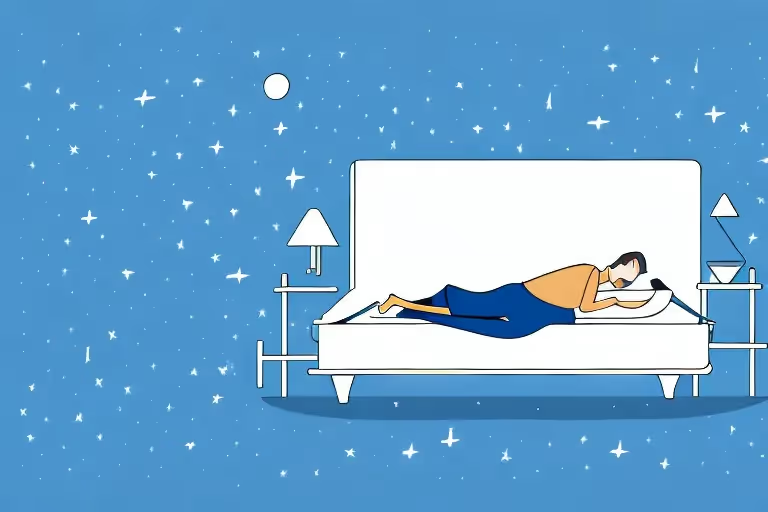In the complex world of mental health medications, it can sometimes feel overwhelming to understand the multitude of facets linked to a single treatment. One such medication that continuously surfaces in mental health discussions is Sertraline. Frequently prescribed to assist with conditions such as depression and anxiety, Sertraline, like many powerful medications, presents potential side effects that force us to ask ourselves critical questions about our wellbeing. One such query that often arises is centered around a completely bodily reaction - night sweats. In this comprehensive review, we will delve into the topic of Sertraline, night sweats, and the intricate path that connects these two phenomena.
What is Sertraline?
Sertraline, routinely known under the brand name Zoloft, is a type of antidepressant that falls under the category of selective serotonin reuptake inhibitors (SSRIs). SSRIs work to alleviate symptoms of depression by enhancing the brain's chemical balance. They achieve this by increasing the intensity of serotonin, a neurotransmitter that impacts our emotional wellbeing and mood, in the brain.
Sertraline, specifically, was approved for medical use in the United States in 1991. Over its span of existence, it has been primarily used to treat a range of mental health conditions including clinical depression, obsessive-compulsive disorder, panic disorder, and social anxiety disorder.
The Role of Sertraline in Mental Health
Sertraline has a fundamental role in managing mental health conditions, especially those associated with mood regulation. It functions by preventing serotonin from being reabsorbed back into the nerve cells in the brain, hence elevating the mood of the individuals taking them. This allows the neurotransmitter to have a more prolonged effect on the nerve cells, ensuring that the person taking the medication can feel more light-hearted and in control of their mental state.
Furthermore, sertraline has been found to have positive effects on cognitive function. Studies have shown that it can improve memory and concentration, which can be particularly beneficial for individuals dealing with cognitive impairments associated with depression or anxiety.
In addition to its mood-enhancing properties, sertraline has been found to have a neuroprotective effect. It has been shown to promote the growth and survival of neurons in the brain, which can help in preventing further damage and degeneration in individuals with certain mental health conditions.
While there are many medications available on the market to manage mental health conditions, sertraline commonly becomes the first choice due to its high efficacy and generally favorable side-effect profile. Its effectiveness in treating a wide range of mental health disorders has made it a go-to option for many healthcare professionals.
Find Peace and Sleep Restfully with the Aura Meditation and Sleep Stories App
Try it Free!
Common Side Effects of Sertraline
As with many medications, sertraline can bring about a number of mild and generally well-tolerated side effects. These may include nausea, dry mouth, upset stomach, and sleep problems. Notably, one of the less frequently discussed side effects of SSRIs, such as sertraline, is night sweats. This may appear as a mild discomfort, or it could indicate something more severe. The complexity of this side effect necessitates a closer examination.
It is important to note that not everyone experiences these side effects, and they may vary in severity from person to person. Additionally, most side effects tend to be temporary and diminish as the body adjusts to the medication.
Furthermore, it is essential to consult with a healthcare professional before starting or altering any medication regimen. They can provide personalized guidance and monitor for any potential adverse effects. It is crucial to weigh the potential benefits of sertraline in managing mental health conditions against the possible side effects to make an informed decision about treatment options.
Exploring the Phenomenon of Night Sweats
This bodily reaction, commonly known as night sweats, is characterized by excessive sweating during the night. Though you may naturally sweat somewhat due to a warm bedroom environment or heavy blankets, night sweats are considerably more intense. They usually saturate your clothing and linens, and might be recurrent enough to disrupt your sleep patterns.
Night sweats can affect individuals of all ages and can be triggered by varying causes, not only effectively understood as symptomatic of a considerable number of medications, including SSRIs such as sertraline but can also be indicative of a slew of medical conditions.
When it comes to the causes of night sweats, there are a multitude of factors to consider. While medication can indeed be a cause of night sweats, they are also associated with numerous other health concerns. For instance, hormonal imbalances, infections, and certain types of cancer can all lead to night sweats. Furthermore, lifestyle factors such as stress, dietary habits, and consumption of substances like caffeine or alcohol can also contribute to this condition.
It is extremely important to consult with a healthcare professional if you are experiencing night sweats regularly and are concerned about your symptoms – they could be a sign of a larger health concern.
Living with the condition of night sweats can be exceedingly troublesome due to its profound effect on sleep quality. Constantly waking up drenched in sweat leads to frequent interruptions in sleep, making it difficult for sufferers to feel well-rested and refreshed in the morning. This lack of restful sleep can, in turn, exacerbate mental health conditions and create a vicious cycle that is challenging to escape.
When night sweats occur, they can be accompanied by other symptoms that further disrupt sleep. Some individuals may experience hot flashes, palpitations, or feelings of anxiety or discomfort. These additional symptoms can intensify the already unpleasant experience of night sweats, making it even more crucial to seek medical advice and explore potential treatment options.
Managing night sweats can involve a combination of lifestyle changes and medical interventions. For instance, wearing lightweight and breathable sleepwear, using moisture-wicking bedding, and keeping the bedroom cool can help minimize the discomfort caused by night sweats. Additionally, addressing underlying health conditions or adjusting medication regimens under the guidance of a healthcare professional may provide relief.
It is worth noting that night sweats can vary in severity and frequency from person to person. Some individuals may only experience occasional episodes, while others may endure nightly bouts of excessive sweating. Understanding the unique patterns and triggers of your night sweats can empower you to take proactive steps towards managing this condition and improving your overall sleep quality.
In conclusion, night sweats can be a distressing and disruptive phenomenon that affects sleep quality and overall well-being. By seeking medical advice, making necessary lifestyle adjustments, and exploring appropriate treatment options, individuals can find relief and regain control over their sleep patterns.
The Connection Between Sertraline and Night Sweats
While it's well-known that certain medications induce night sweats, the link between sertraline and night sweats is often overshadowed by the drug's more prevalent side effects such as nausea and fatigue. However, studies have confirmed that sertraline, like many SSRIs, can indeed cause night sweats.
Sertraline, commonly known by its brand name Zoloft, is a selective serotonin reuptake inhibitor (SSRI) used primarily to treat depression, anxiety disorders, and obsessive-compulsive disorder. It works by increasing the levels of serotonin, a neurotransmitter that helps regulate mood, in the brain. While sertraline is generally well-tolerated, it can lead to various side effects, including night sweats.
Why Sertraline May Cause Night Sweats
The exact reason why sertraline may induce night sweats is not yet entirely understood. However, some experts theorize that SSRIs, like sertraline, lead to night sweats by impacting the body's thermoregulation – essentially, they may interfere with the body's normal way of controlling temperature. Serotonin, the neurotransmitter affected by sertraline, plays a role in regulating body temperature, and any disruption in its balance could potentially contribute to night sweats. Additionally, night sweats could be an indirect result of other sertraline side effects such as vivid dreams or nightmares.
It is important to note that not everyone who takes sertraline will experience night sweats. The occurrence and severity of this side effect can vary from person to person. Factors such as dosage, individual physiology, and the presence of other medications or medical conditions may influence the likelihood of experiencing night sweats while taking sertraline.
Research on Sertraline-Induced Night Sweats
Despite the prevalence of night sweats as a side effect of sertraline, little research has so far been conducted to understand why this connection exists. Most studies that mention this side effect are anecdotal in nature, describing individual experiences rather than seeking to confirm a widespread phenomenon. However, anecdotal evidence can still provide valuable insights and raise awareness among healthcare professionals and patients.
As the medical and scientific communities continue to evolve, it is hoped that more comprehensive studies will be conducted to further understand this complex issue and develop better strategies to manage it. The investigation of sertraline-induced night sweats could involve exploring the mechanisms by which SSRIs affect thermoregulation and serotonin levels, conducting clinical trials with larger sample sizes, and examining potential interactions with other medications or medical conditions.
In the meantime, individuals who experience night sweats while taking sertraline should consult their healthcare provider. They may be able to provide guidance on managing this side effect, adjusting the dosage, or exploring alternative treatment options.
Managing Night Sweats Caused by Sertraline
If you're experiencing night sweats due to sertraline, it's important to understand that there are actionable measures to help manage this issue. These strategies involve a combination of lifestyle modifications and potential medical interventions.
Night sweats can be a distressing and uncomfortable symptom that some individuals experience while taking sertraline, a commonly prescribed medication for various mental health conditions. However, by implementing certain lifestyle changes and seeking medical guidance, it is possible to alleviate and manage this side effect effectively.
Lifestyle Changes to Reduce Night Sweats
Avoiding triggers that are known to exacerbate night sweats, such as spicy foods, caffeine, and alcohol, can make a substantial difference for many individuals. These substances can stimulate the body's temperature-regulating system, leading to increased perspiration during sleep. By limiting or eliminating their consumption, you may experience a reduction in the intensity and frequency of night sweats.
In addition to avoiding triggers, maintaining a cool sleeping environment can also contribute to managing night sweats. Using breathable bed sheets and nightclothes made of natural fibers, such as cotton, can help promote ventilation and prevent overheating. Installing a fan or adjusting the air conditioning in your bedroom can provide a refreshing breeze, aiding in temperature regulation. Furthermore, taking a cool shower before bed can help lower your body temperature, potentially reducing the occurrence of night sweats.
It's important to maintain open communication with your healthcare provider about your symptoms and any lifestyle modifications you're making to manage them. They can provide further guidance and help you assess the effectiveness of these strategies. Your healthcare provider may also recommend keeping a sleep diary to track the frequency and severity of your night sweats, which can assist in identifying patterns or triggers.
Medical Interventions for Night Sweats
If lifestyle changes aren't effective in suppressing your symptoms or if your symptoms are particularly severe, your healthcare professional might recommend medical intervention. This could involve adjusting the dosage of your sertraline prescription, switching to another medication, or prescribing a medication specifically to manage the night sweats.
It is important to note that night sweats can sometimes be a symptom of an underlying medical condition. Therefore, your healthcare provider may also conduct further investigations to rule out any serious underlying causes. These investigations may include blood tests, hormonal evaluations, or other diagnostic procedures, depending on your specific situation.
Remember, every individual's experience with night sweats may vary, and what works for one person may not work for another. It's crucial to work closely with your healthcare provider to find the most effective management plan tailored to your needs. With their expertise and support, you can navigate through this temporary side effect and continue your sertraline treatment with confidence.
When to Seek Medical Attention
Everybody reacts differently to medications, and what might seem like a minor inconvenience to one person could be a significant impediment to qualified mental health for another. Therefore, it's important to seek medical attention if you're experiencing side effects from sertraline that are hindering your quality of life.
When it comes to mental health, it's crucial to prioritize your well-being and seek help when needed. While some side effects of sertraline may be tolerable, others can greatly impact your daily functioning. It's essential to recognize when the side effects become too burdensome and seek medical attention to address them.
Recognizing Serious Side Effects of Sertraline
Some side effects of sertraline are more severe and require immediate medical attention – such as hallucinations, fainting, irregular heartbeat, or severe nausea/vomiting. These severe side effects can be alarming and may indicate a more serious underlying issue. It's crucial to contact a healthcare provider if you experience any of these symptoms.
When it comes to your health, it's always better to err on the side of caution. Seeking medical attention promptly can help prevent any potential complications and ensure that you receive the necessary care and support.
When Night Sweats Indicate a More Serious Condition
It's equally significant to seek timely medical intervention if you're experiencing persistent night sweats, whether or not you're taking sertraline. Night sweats can be bothersome and disruptive to your sleep, but they can also be indicative of other serious conditions.
Conditions such as lymphoma, tuberculosis, or endocrine disorders can present with night sweats as one of the symptoms. While it's important not to jump to conclusions, consulting with a healthcare provider can help identify the root cause and provide appropriate guidance.
By seeking medical attention, you can ensure that any underlying conditions are diagnosed and treated promptly. Your healthcare provider can help develop a comprehensive plan to manage your symptoms effectively and improve your overall quality of life.
Conclusion: Balancing Mental Health and Physical Comfort
At the end of the day, the balance between mental health management and physical comfort is a deeply personal one. Each person's unique needs and experiences will guide them towards their own distinctive equilibrium. What matters most is that you feel equipped and supported in navigating this journey. This requires continuous communication with your healthcare provider, an understanding of your body and its reactions, and the utilization of tools such as medical interventions or apps like Aura Health, that can assist in managing your mental health.
The Aura Health app provides digital tools to track your moods, habits, and overall wellbeing while also offering mindfulness exercises and guided meditations. It's a reliable support system that can augment the medicinal aspects of mental health treatment, fostering resilience, and aiding in the management of side effects like night sweats that can otherwise hinder your path to mental wellness. Remember, you don't have to walk this path alone.
Aura is Your All In One App for Meditation, Mindfulness Wellbeing
Find peace every day with one app for your whole well-being. There is no one-size-fits-all solution to mental well-being. Aura is the first all-in-one wellness app that learns how to best help you. Discover an endless library of expert-created tracks for your well-being, all taught by the world’s best coaches, therapists, and storytellers. With Aura's personalized recommendations, you can find peace every morning, day and night.
Find Peace and Sleep Restfully with the Aura Meditation and Sleep Stories App



.webp)






.avif)

%20(1).avif)


.avif)
.avif)
.webp)


.avif)


















































































































.avif)

















.svg)









